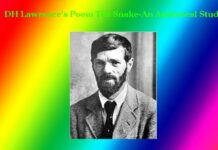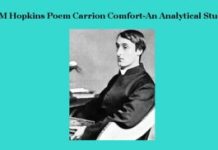The Poetry of Swami Vivekananda-Chief Features
Swami Vivekananda (1863-1902) was a scholar, sage, preacher, thinker, and above all a poet. As a poet, he was religious, philosophical, spiritual, and above all mystical. He both as a man and as a poet was a consummate Hindu. The Hindu scriptures shaped both his body and soul and hence his entire set of poetry is based on Hindu philosophy.
”The Cup’ is a poem that is replete with the mysticism of human life on earth. Through this poem, the poet reveals that the world is full of sorrows and suffering. Suffering purifies life of its sins and through sufferance one becomes able to go to heaven. The poet says:
”This is your road-a painful road and dear.
I made the stones that never give you rest.
I set your friend in pleasant ways and clear,
And he shall come like you, unto My breast.
But you, My child must travel here.
This is your task. It has no joy nor grace,”
The Poetry of Swami Vivekananda-Chief Features
‘Kali the Mother‘ is a poem in which he evokes Kali, as the Mother of Death and Destruction- that means the mother or goddess of human beings. In this poem, Kali is shown bearing mighty power whose advent is inevitable to destroy the evils of human society as well as of human heart. The poet says:
”Dancing mad with joy,
Come, Mother, come!
For Terror is Thy name,
Death is in Thy breath,
And every shaking step
Destroys a world for e’er,
Thou ‘Time’, the All Destroyer!
Come, O Mother, come!”
The Poetry of Swami Vivekananda-Chief Features
‘Peace’ is another philosophical as well as a mystical piece of poetry. In this poem, the poet tries to define or characterize ‘Peace’. Really ‘Peace’ is a mental state. He says that only joy is not peace, only light is not peace, only beauty is not peace. It is the combination of darkness and light, joys and sorrows. By saying so, he wants to mean that life is full of joys and sorrows and peace comes to him who can welcome both. The poet says in the poem:
”Behold, it comes in might,
The power that is not power,
The light that is in darkness,
The shade in dazzling light.”
Again in the same poem, he says:
”It is not joy nor sorrow,
But that which is between,
It is not night nor morrow.
But that which joins them in.”
The Poetry of Swami Vivekananda-Chief Features
Thus the above analyses of his poems show that his poems are philosophical in nature and mystic in meaning based on Hindu philosophy.
Mystic poems are generally difficult to comprehend and so are his poems. All his poems are written in a compact style that is full of obscurity, ambiguity, and complexity. For example, the following lines may be quoted from the poem ‘The Cup’:
”In the deep years of yesterday, I know
This is your road- a painful road and drear,
I made the stones that never give you rest.”
His imageries are also so, as we see in the poem ‘Kali the Mother’:
”The stars are blotted out,
The clouds are covering clouds,
It is darkness vibrant, sonant,
In the roaring, whirling wind
Are the souls of a million lunatics
Just loose from the prison house.”
The Poetry of Swami Vivekananda-Chief Features
Some of his expressions are riddle-like as the following lines quoted from the poem ‘Peace’-
”It is joy that never spoke
And grief unfelt, profound,
Immortal life unlived
Eternal death unmourned.”
To conclude it is to say that Vivekananda is a true Hindu mystic poet and as a mystic poet he is a greater one. 0 0 0
The Poetry of Swami Vivekananda-Chief Features
N.B. The article ‘The Poetry of Swami Vivekananda– Chief Features’ originally belongs to the book ‘Indian English Poets and Poetry-Chief Features‘ by Menonim Menonimus.
Books of Composition by M. Menonimus:
- Advertisement Writing
- Amplification Writing
- Note Making
- Paragraph Writing
- Notice Writing
- Passage Comprehension
- The Art of Poster Writing
- The Art of Letter Writing
- Report Writing
- Story Writing
- Substance Writing
- School Essays Part-I
- School Essays Part-II
- School English Grammar Part-I
- School English Grammar Part-II..
Related Search:











